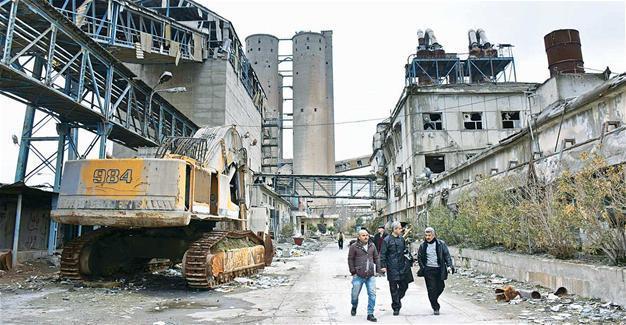Syrian regime says safe zones should be ‘discussed with us’
BEIRUT
 Syria warned on Jan. 30 that safe zones for civilians proposed by U.S. President Donald Trump could only be established in coordination with Damascus, as the plans would otherwise violate the country’s sovereignty.
Syria warned on Jan. 30 that safe zones for civilians proposed by U.S. President Donald Trump could only be established in coordination with Damascus, as the plans would otherwise violate the country’s sovereignty.The announcement was made in Damascus by Foreign Minister Walid al-Moallem during a meeting with the head of the U.N. refugee agency UNHCR, Filippo Grandi.
Syrian state news agency, SANA, said the Foreign Ministry and UNHCR officials greed that any attempt to impose safe zones without coordination with the Syrian government would be an “unsafe act and will pose a violation of the Syrian sovereignty.”
The announcement came about a week after the Trump administration’s expressed interest in setting up safe zones for civilians in war-torn Syria, an idea that was greeted with caution by Russia and Turkey, even though Turkey for years has defended the setting up of a “safe zone” or a “no-fly zone” inside Syria in order to cope with the ever growing number of migrants.
Turkey and Russia have also taken the lead in the latest peace efforts to end the Mideast country’s devastating six-year war by organizing a peace talk in the Kazakh capital of Astana on Jan. 23.
Rebel backers including Qatar have welcomed Trump’s support for safe zones.
The White House said Trump and Saudi Arabia’s King Salman agreed in a telephone call on Jan. 29 to support safe zones in Syria and Yemen.
It was Damascus’s first comment on the issue since Trump said last week that he would “absolutely do safe zones in Syria” for refugees fleeing violence in the war-torn country.
According to a document seen by Reuters, Trump is expected to order the Pentagon and State Department to craft a plan for setting up the safe zones, a move that could risk escalation of U.S. military involvement in Syria’s conflict.
The idea of safe zones, proposed by both Republican Trump and Democrat Hillary Clinton during the U.S. presidential election campaign, was ruled out by the Obama administration for fear it would put U.S. aircraft in harm’s way with Russia waging an air campaign to aid Syrian President Bashar al-Assad’s forces since September 2015.
Russian Foreign Minister Sergei Lavrov on Jan. 30 said the idea of creating safe zones in Syria would require the coordination of the U.N. and other international organizations.
Trump’s decision to create safe zones in Syria aimed to ease the refugee issue in Europe, particularly in neighboring countries, Lavrov told a Moscow news conference held with his Eritrean counterpart Osman Saleh.
“The creation of such zones can be considered with the coordination of the U.N. High Commissioner for Refugees and other international organizations,” Lavrov said.
He also said such zones should be made with the coordination of the Syrian regime.
Syrian FM calls on citizens to return
Meanwhile, al-Moallem called on all Syrians refugees who fled the war to return home, pledging that the government wpışd meet all their needs. It was not clear if the call was related to Trump’s signing of executive orders placing a 90-day ban on travel to the U.S. by citizens of Iraq, Syria, Iran, Sudan, Libya, Somalia or Yemen, and a 120-day suspension of the U.S. refugee program. Syrians are indefinitely blocked from entry.
Syria’s conflict, which began in March 2011, has forced 4.8 million people to flee Syria, according to the UNHCR.
Turkey has taken in more than 2.7 million Syrians, the UNHCR says, and is now the main host country. It is followed by Lebanon with more than 1 million Syrian refugees, according to the U.N.
The UNHCR says Jordan has taken in 655,000 Syrians, but Amman says the number is much higher at 1.4 million.
At least another 228,000 Syrians have taken refuge in Iraq and 115,000 in Egypt, the refugee agency says.
Syrian refugees have in increasing numbers travelled to, or tried to reach, Europe, making the perilous journey over ground or by sea.
SANA said al-Moallem briefed Grandi on the “huge efforts” the Syrian government is exerting to improve the living conditions of its people and the displaced as well.
For his part, Grandi said the offering of humanitarian aid would continue.
















